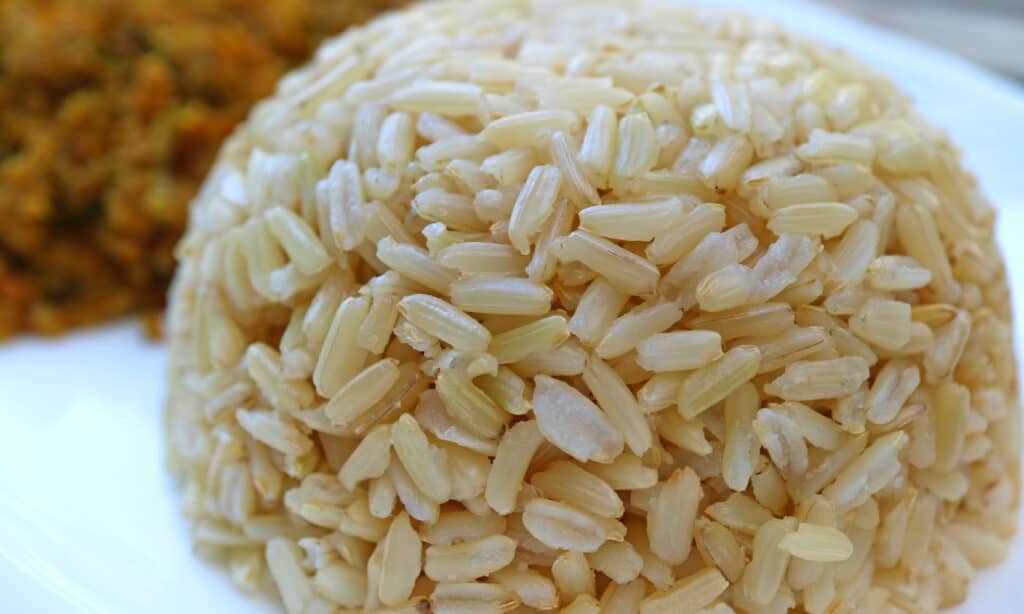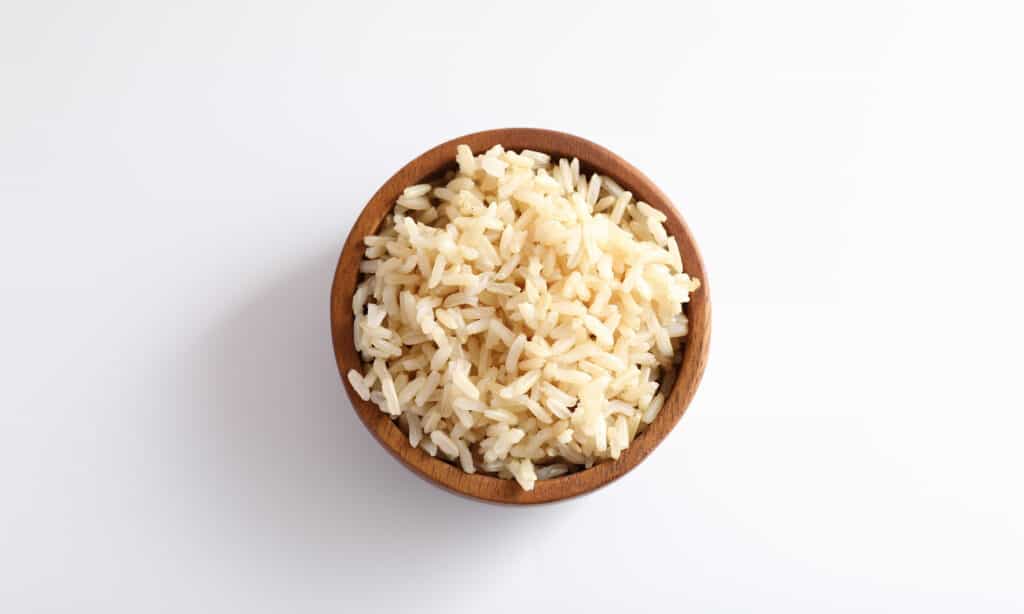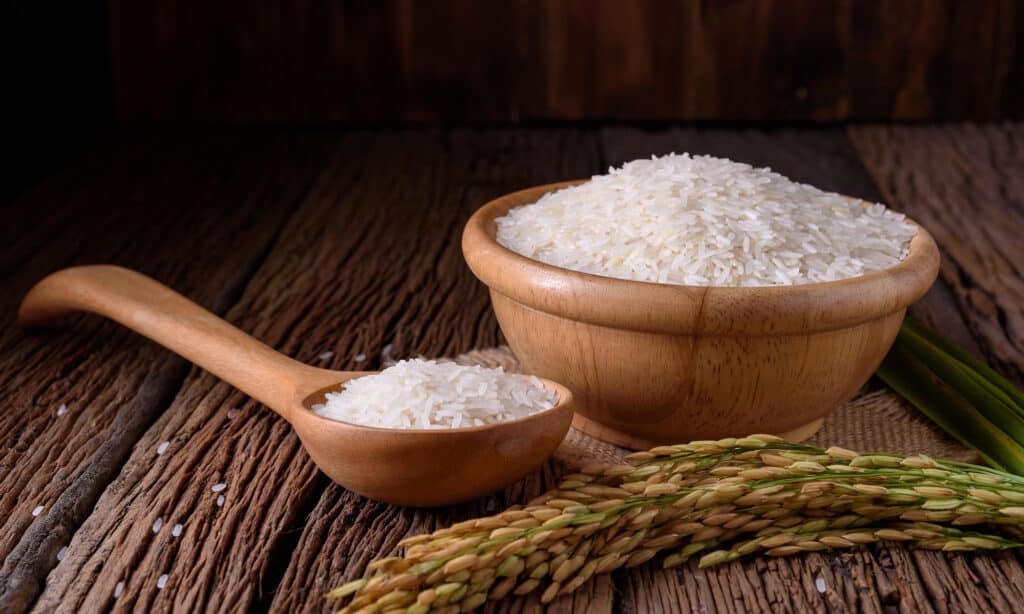If you’re a dog owner, you may have wondered about incorporating human foods into your furry friend’s diet. One of the popular questions is whether dogs can eat rice, particularly Jasmine Rice. While rice is often a staple in many cuisines worldwide, it’s essential to know whether it’s safe or dangerous for your canine companion. In general, the answer is yes! Dogs can eat Jasmine Rice in moderation. In this comprehensive guide, we’ll explore the benefits and risks of feeding your dog Jasmine Rice, as well as other types of rice that are safe for them. We’ll also discuss the spices commonly added to Jasmine Rice, the nutrients it provides, and whether it’s suitable for puppies, adult dogs, and sick dogs. So, read on to find out everything you need to know about feeding rice to your furry friend!

Can Puppies Eat Jasmine Rice?
When it comes to feeding puppies, it’s crucial to ensure that their diet meets their unique nutritional needs. Jasmine Rice can be a healthy addition to your puppy’s diet if introduced correctly. Puppies have sensitive digestive systems and may not tolerate large amounts of certain foods, including rice.
That said, Jasmine Rice is generally considered safe for puppies to eat, provided it’s cooked and served plain without any spices or additives. Additionally, you should introduce rice to your puppy’s diet gradually and in small portions to avoid upsetting their stomachs.
It’s also worth noting that while rice is a good source of carbohydrates, it should not be the only source of nutrition for your puppy. Feed your puppy a balanced mix of protein, fat, and essential nutrients for their growth and development.
Overall, feeding Jasmine Rice to your puppy can be a healthy addition to their diet when done correctly. If you’re unsure about feeding rice to your puppy, consult with your veterinarian to determine the best course of action.
Can Adult Dogs Eat Jasmine Rice?
Adult dogs can safely consume Jasmine Rice in moderation as part of a balanced diet. As a source of carbohydrates, rice can provide energy for your dog’s activities, making it a healthy addition to their diet.
However, it’s essential to note that not all adult dogs can tolerate rice. Some dogs may be allergic to rice or may have a sensitive digestive system, making it difficult for them to digest. In such cases, it’s best to avoid feeding rice to your dog or consult with your veterinarian before doing so.
Additionally, Jasmine Rice should be served plain, without any spices or additives, as many spices can be harmful to dogs. Dogs should also not be fed with leftover rice that has been seasoned or mixed with other ingredients like onions or garlic, which are toxic to dogs.
When feeding your dog Jasmine Rice, it’s crucial to introduce it gradually and in small amounts to avoid upsetting their stomach. Make sure to provide your dog with balanced nutrients, including protein and fat, for optimal health.
Jasmine Rice can be a healthy addition to an adult dog’s diet when introduced correctly and served in moderation. As with any new food, it’s crucial to observe your dog’s reactions and consult with your veterinarian if you have any concerns.

Is Jasmine Rice Good for Sick Dogs?
Jasmine Rice can be beneficial for sick dogs, especially those experiencing digestive issues like diarrhea or vomiting. As a bland, low-fiber food, Jasmine Rice can help soothe your dog’s stomach and promote normal bowel movements.
When feeding Jasmine Rice to sick dogs, it’s essential to serve it plain, without any spices or additives that can irritate their digestive system. Make sure to include protein and fat in their diet for overall health and wellbeing.
It’s important to note that Jasmine Rice should not be the sole treatment for sick dogs and should only be used in combination with veterinary treatment. In cases of severe illness, it’s crucial to seek veterinary care immediately.
If your dog has a chronic illness or digestive issues, consult with your veterinarian before introducing Jasmine Rice to their diet to determine the best course of action. Jasmine Rice can be a helpful addition to a sick dog’s diet, but it should only be used as part of a comprehensive veterinary treatment plan.
Does Jasmine Rice Help Dogs with Diarrhea?
Yes, Jasmine Rice can help dogs with diarrhea!
When a dog has diarrhea, their digestive system is irritated and inflamed, and it’s crucial to feed them foods that are easy to digest and gentle on their stomach. Jasmine Rice is a bland, low-fiber food that can help soothe your dog’s digestive system and promote normal bowel movements.
The high starch content in Jasmine Rice can also help bind loose stools and reduce the frequency and severity of diarrhea. Serve plain cooked rice to prevent digestive issues in dogs; avoid spices and additives.
Additionally, you can mix boiled chicken or boiled lean meat with the rice to provide some protein, as long as the meat is cooked and plain. Feed your dog frequent small meals of rice and meat to ease diarrhea and prevent dehydration.
It’s important to note that while Jasmine Rice can help ease diarrhea, it should not be the sole treatment for your dog’s condition. If your dog has severe or persistent diarrhea, it’s crucial to seek veterinary care to determine the underlying cause and appropriate treatment.

Spices Commonly Added to Jasmine Rice
Jasmine Rice is often served with various spices and seasonings to enhance its flavor and aroma. However, many of these spices can be harmful to dogs and should be avoided when feeding them Jasmine Rice.
Spices like onion and garlic are particularly toxic to dogs and can cause serious health issues, including anemia and gastrointestinal problems. Other spices like cumin, chili powder, and paprika can also be harmful to dogs, causing digestive issues, respiratory problems, and even kidney failure in severe cases.
It’s crucial to serve Jasmine Rice plain, without any spices or additives that can be harmful to your dog’s health. If you want to add some flavor to your dog’s rice, consider adding plain, cooked lean meat like boiled chicken or turkey.
It’s important to note that while some spices may be safe for dogs, it’s best to consult with your veterinarian before introducing them to your dog’s diet. Additionally, always monitor your dog’s reactions and discontinue any foods that cause adverse effects.
Nutrients in Jasmine Rice
Jasmine Rice is a great source of carbohydrates that can provide your furry friend with energy for their daily activities. Not only is it low in fat and cholesterol-free, but it also contains essential vitamins and minerals like thiamin, niacin, and magnesium that help support your dog’s overall health and wellbeing.
Thiamin, which is vitamin B1, plays a role in your dog’s nervous system and metabolism. Niacin, which is vitamin B3, helps keep their skin healthy and promotes normal digestion. Magnesium, on the other hand, is an essential mineral that helps maintain strong bones, muscles, and immune function.
It’s essential to remember that Jasmine Rice should not be the only source of nutrition in your dog’s diet. A well-balanced diet should consist of various foods that provide them with the right amount of protein, fat, and other vital nutrients.

Is All Rice Safe for Dogs?
When it comes to feeding rice to dogs, not all types of rice are safe. Jasmine Rice is safe, but some rice types can be harmful and should be avoided for dogs.
For example, wild rice and brown rice contain high levels of arsenic, a toxic substance that can cause cancer, skin lesions, and other health issues in dogs. Black and red rice may contain antioxidants that are healthy for humans but harmful to dogs.
When feeding your dog rice, it’s crucial to choose plain, white rice that is cooked correctly and served without any additives or spices. Rice should also be served in moderation and should not make up the majority of your dog’s diet.
It’s also essential to note that rice should not be the only source of nutrition in your dog’s diet. Dogs need protein, fat, and essential nutrients for overall health and wellbeing.
Types of Rice for Dogs
| Type of Rice | Description |
|---|---|
| Brown Rice | Whole grain rice that is high in fiber and nutrients, including manganese and selenium. It’s a great source of carbohydrates and can help regulate blood sugar levels. |
| White Rice | Refined rice that has had the bran and germ removed, resulting in a lower fiber content. It’s still a good source of carbohydrates and can be easily digestible for dogs with sensitive stomachs. |
| Basmati Rice | A long-grain rice that is low in fat and high in carbohydrates. It has a unique flavor and aroma that some dogs may enjoy. |
| Jasmine Rice | Another long-grain rice with a delicate flavor and aroma. It’s a good source of carbohydrates and can be easily digestible for dogs. |
| Wild Rice | Not actually a type of rice, but a seed from a type of grass. It’s high in fiber, protein, and minerals, and can provide some variety to a dog’s diet. |

Can Dogs Eat Jasmine Rice: Verdict and Final Thoughts
In conclusion, feeding rice to dogs can be a healthy addition to their diet, but it’s important to choose the right type of rice and serve it correctly. While white rice is the most commonly recommended type for dogs, brown, Jasmine, and Basmati Rice are also safe options in moderation. Wild, black, and red rice should be avoided as they can be harmful to dogs.
When serving rice to your furry friend, ensure that it’s plain, cooked, and served without any spices or additives. Rice should only make up a small portion of your dog’s diet, and it should not be the sole source of nutrition.
Remember, consulting with your veterinarian can help determine the best diet plan for your dog based on their individual needs and health status. Choose the right rice, feed in moderation for a healthy and nutritious diet that supports dog’s health.
Anastasio, A. (2022, August 8). Can Dogs Eat Rice? American Kennel Club; American Kennel Club. https://www.akc.org/expert-advice/advice/can-dogs-eat-rice/
~Sheena
